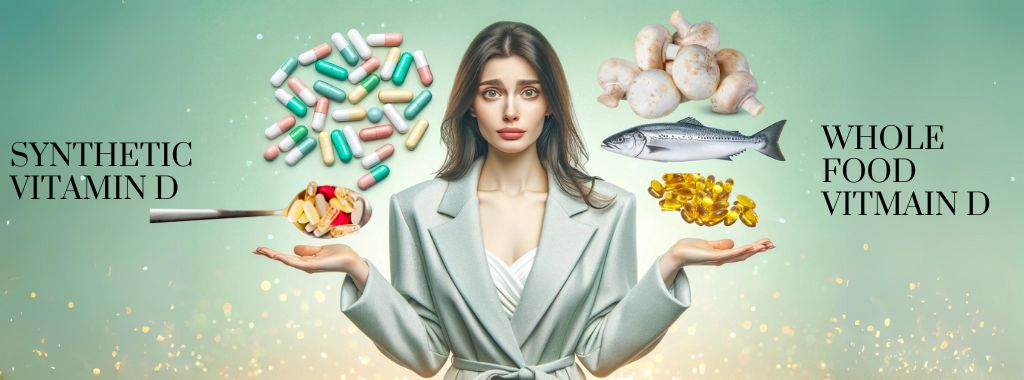1. Introduction: Embracing Whole Food Vitamin D
In the realm of vitamin D supplementation, the choice between synthetic and whole food vitamin D is critical. Many are unaware that the vast majority of Vitamin D3 on the market is synthetically produced through harsh treatments of sheep wool. This method of production is not only a concerning animal welfare issue, but it also raises a question about the quality and integrity of the resulting supplement. This can be seen as a stark contrast to the natural, whole-food sources of Vitamin D, where nutrients work together in synergy, leading to better absorption and utilization by the body.
2. The Distinction Between Synthetic and Whole Food Vitamin D
Isolated, synthetic Vitamin D3, such as that derived from sheep wool, is produced through a series of complex chemical processes starting from the shearing of mature, live sheep. The wool is processed, and lanolin, a type of wax secreted by the sheep’s skin, is extracted. From this lanolin, the Vitamin D3 that ends up in many dietary supplements is produced. This isolated compound, although chemically identical to the Vitamin D3 our body produces, is devoid of any other nutrients.
In contrast, Vitamin D found in whole food sources like cod liver oil or UV-exposed mushrooms isn’t isolated but comes bundled with a host of other nutrients that work together in harmony within our bodies. For instance, Cod liver oil is rich not only in Vitamin D3 but also Vitamin A, omega-3 fatty acids, and other essential nutrients. UV-exposed mushrooms, in addition to Vitamin D2, offer a good source of B-vitamins, selenium, and potassium. These synergistic nutrients enhance the body’s ability to absorb and utilize Vitamin D, leading to better digestion and absorption.
This distinction between synthetic and whole food sources of Vitamin D significantly impacts how our bodies can utilize the vitamin. While synthetic Vitamin D3 can help fill nutritional gaps and prevent deficiencies, the accompanying nutrients in whole food sources can offer broader health benefits, leading to better health outcomes and a more balanced approach to supplementation.
3. The Harsh Reality Behind Synthetic Vitamin D Production
The production process of synthetic Vitamin D3 begins with the shearing of mature, live sheep. The wool undergoes a series of treatments to extract crude lanolin, which then undergoes further saponification and separation processes. From the lanolin, crude cholesterol is extracted using solvent washes and/or column chromatography, and then subjected to a four-step chemical process to create pre-Vitamin D3. This pre-Vitamin D3 is then irradiated to produce Vitamin D3. These complex, high-energy procedures consume considerable resources and produce waste, posing environmental concerns. Additionally, the synthetic solvents and detergents used can have adverse effects on our health if not completely removed from the final product.
4. Championing Two Exceptional Whole Food vitamin D
For those looking to supplement their diet with Vitamin D, two outstanding whole food sources to consider are Cod Liver Oil and UV-exposed whole mushrooms. These natural options offer a wealth of health benefits and bypass the disadvantages linked with synthetic vitamins.
Cod Liver Oil, a traditional dietary supplement, is loaded with health-supporting nutrients like omega-3 fatty acids and vitamins A and D. The Vitamin D in Cod Liver Oil is present as D3, or cholecalciferol, which is readily used by your body. UV-exposed whole mushrooms offer a unique plant-based source of this critical nutrient, making it an ideal option for vegetarians and vegans. The result is a vegan-friendly, whole food source of Vitamin D2, also known as ergocalciferol, and other health-supporting nutrients like B-vitamins, selenium, and potassium.
5. The Superiority of Whole Food Vitamins Over Synthetic
Whole food sources of vitamins have a synergistic effect due to the combination of nutrients they contain. These nutrients work together in the body, complementing each other’s effects and improving absorption. Synthetic vitamins lack these synergistic relationships and are often not as easily absorbed or utilized by the body. Whole food vitamins are also more sustainable and environmentally friendly than their synthetic counterparts due to their more natural production processes.
6. Eat Intact: A Sustainable Solution
Responding to the increasing need for natural and sustainable supplementation, Eat Intact introduces its revolutionary whole food Vitamin D supplement. It’s crafted from organically and sustainably grown whole mushrooms that are exposed to UV light, a process that naturally boosts the mushrooms’ Vitamin D content. By doing so, it mirrors the body’s own Vitamin D production process. These Vitamin-D-rich mushrooms are then carefully dried, finely pulverized, and encapsulated, maintaining the integrity of the Vitamin D2 and keeping the product as pure as possible with only two ingredients.
As the only organic, vegan, whole-food Vitamin D2 supplement on the market, Eat Intact offers an unrivaled choice for health-conscious individuals, holistic enthusiasts, vegans, and vegetarians. This innovative product offers a unique opportunity to consume Vitamin D in a form that is not only beneficial to your body but also contributes to the health of our planet.
Making the switch to Eat INTACT’s whole food Vitamin D supplement signifies more than just a change in your supplement routine, it signifies a commitment to a sustainable, health-conscious, and holistic lifestyle. With Eat Intact, you’re not just choosing a supplement, you’re choosing a healthier and more sustainable future.

